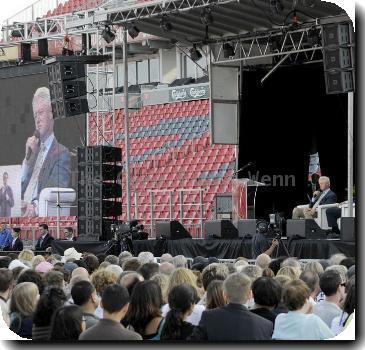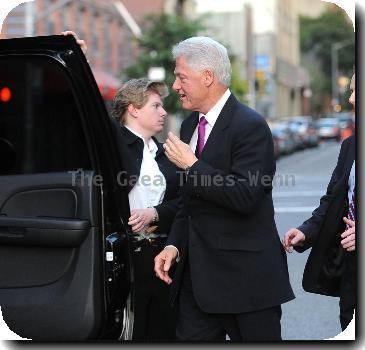Ex-President Carter says US must prove to ‘paranoid’ NKorea that it has no intention to attack
By Sangwon Yoon, APTuesday, March 23, 2010
Carter: US, SKorea must talk directly with NKorea
SEOUL, South Korea — The U.S. and South Korea must prove to North Korea that they do not harbor any hostile intent if they want to avoid a “catastrophic war” with the nuclear-armed regime, former U.S. President Jimmy Carter said Tuesday.
Carter, whose historic visit to Pyongyang in 1994 led to a landmark disarmament deal with North Korea, described the North as “stubborn” and “paranoid,” and said sanctions are unproductive.
He said the communist regime is unlikely to back down from the standoff over its nuclear weapons program without “a firm statement of ‘no hostile intent’ in the form of a treaty.”
Carter, in accepting an honorary doctorate from Seoul’s Korea University, urged the United States and South Korea to engage in unconditional direct talks with North Korea.
“No one can predict the final answers from Pyongyang, but there is no harm in making a major effort, including unrestrained direct talks,” he said. “The initiative must be from America and South Korea.”
Carter, now 85, went to North Korea in June 1994 as then-President Bill Clinton’s envoy, meeting with late North Korea founder Kim Il Sung, father of the current leader, Kim Jong Il. Kim Il Sung died a month later.
The visit helped thaw the deep freeze in relations with the Korean War foe and paved the way for discussions on nuclear disarmament.
“It was obvious to me when I was in North Korea that there is deep resentment of the past and genuine fear of pre-emptive military attacks in the future,” Carter said.
The 1994 disarmament accord that Carter skillfully negotiated alleviated tensions between the foes but fell apart in 2002 after President George W. Bush called North Korea part of an “axis of evil.”
The two Koreas remain locked in a state of war because their three-year conflict ended in a truce, not a peace treaty, in 1953. The United States still maintains 28,500 troops in South Korea to protect the ally against any aggression.
Pyongyang routinely cites the U.S. military presence as a key reason for building up its nuclear weapons program.
The U.S. and other regional powers have been trying for years to persuade Pyongyang to disarm in return for much-needed aid.
However, the North quit the six-nation disarmament talks last year after being criticized for a rocket launch seen as a violation of U.N. Security Council resolutions against developing its missile program. Weeks later, Pyongyang tested a nuclear bomb, its second, drawing tightened sanctions.
For months, the five other parties — the U.S., China, Japan, South Korea and Russia — have been pushing Pyongyang to rejoin the international disarmament talks.
North Korea, however, has demanded a lifting of sanctions and peace talks with the U.S. on formally ending the Korean War before it returns to the negotiations.
A busy round of diplomatic discussions have failed to yield a concrete promise from Pyongyang to return to the talks. Japanese and South Korean news reports said envoys from the five other nations agreed to hold a preliminary meeting, with or without North Korea.
Carter, a trained nuclear physicist, called sanctions counterproductive. He said the international community should give the impoverished nation humanitarian aid.
He also doubted that a change in leadership would bring any major shift in North Korean policy.
Kim Jong Il, now 68, is believed to be paving the way to name his third son as his successor.
Carter also met South Korean President Lee Myung-bak Tuesday morning and gave Lee his recent book on Middle East peace negotiations, Lee’s spokeswoman Kim Eun-hye said.
Tags: Asia, Bill Clinton, East Asia, Foreign Policy, International Agreements, Lee Myung-bak, North America, North Korea, Nuclear Weapons, Pyongyang, Seoul, South Korea, United States, Weapons Administration, Weapons Of Mass Destruction

